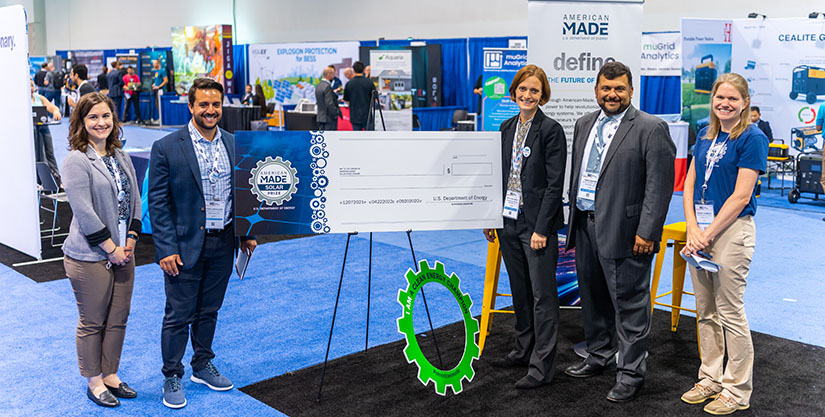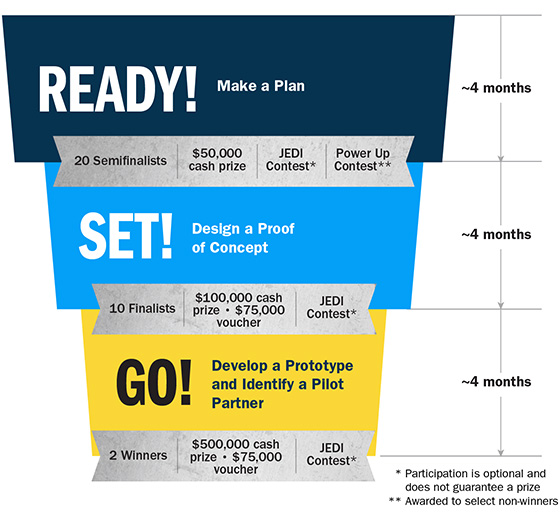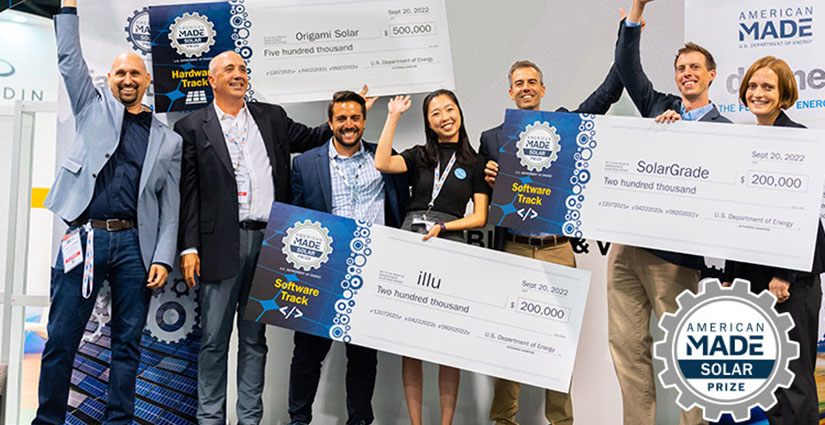Solar Prize Round 7 Semifinalists Bring Bold, Bright Ideas to Competition
20 Teams Win $50,000 and Move on to Set! Contest

A new crop of semifinalists has been selected to move on to the Set! Contest in the American-Made Solar Prize Round 7. Twenty teams from across the country were awarded cash prizes for their innovative solutions for making the solar industry more efficient, cost-effective, and accessible to all.
The U.S. Department of Energy (DOE) announced the semifinalists on Thursday, Jan. 11. Each of the teams was awarded $50,000 to continue advancing their concept in the second phase of the prize. In addition, four teams were awarded an additional $25,000 bonus prize for impactful solutions that increase accessibility to solar energy locally. The optional bonus prize is available in all three phases of the Solar Prize.
DOE also awarded $10,000 prizes to 10 teams through the Power Up Contest, a new contest in the Solar Prize designed to support new entrants to the solar industry. The teams were rewarded for submissions that showed strong potential but were not selected to move on to the Set! Contest. Awardees will use their cash award, along with support from American-Made Power Connectors—the Arrowhead Center at New Mexico State University and the University of Arizona Center for Innovation—to strengthen their innovations and business plans to be more competitive in future competitions.
"While only 20 teams can advance to the next stage of the Solar Prize competition, there are certainly more than 20 teams ready to use their perspectives to make a big impact on the solar industry," said Markus Beck, Manufacturing and Competitiveness Program manager in the DOE Solar Energy Technologies Office. "The Power Up Contest is a way to recognize those innovators and set them on the path to success."
Supporting Winning Ideas in Solar Innovation

Now in its seventh round, the Solar Prize was designed to nurture a broad spectrum of ideas that can advance the solar industry, from software that improves efficiency, to innovative materials with a lower carbon footprint, to systems that reduce maintenance costs.
The prize consists of three contests—Ready!, Set!, and Go!—during which competitors gradually transform their ideas into early-stage prototypes ready for industry testing. In addition to increasing financial support as the prize progresses, competitors also have access to expertise and support from the American-Made Network, which is composed of national laboratories, energy incubators, private entities, and other resources across the country.
The semifinalist teams moving on the Set! Contest are as follows:
Photovoltaics (PV)
- PowerMe (El Cerrito, California) – This team is developing a 3D-printed solar carport for the commercial market to decrease safety risks associated with current carports and expand solar electric vehicle (EV) charging in low- and moderate-income communities. They will reduce costs compared to common solar carports with off-site construction, a wind-load reducing design, and automated 3D concrete printing.
- Vatio (Palo Alto, California) – This team is developing a plug-in solar kit that can be used in a regular home outlet to save residential homeowners money on their energy bills. This system will make residential solar affordable and accessible to customers locked out of the current solar market.
- Pavilion Solar (Miami, Florida) – This team is developing a hurricane-resistant, structurally stable, accessible, and cost-effective solar carport. This innovation will increase residential solar adoption in hurricane-prone areas by providing a product that can endure storms and growing electricity needs.
- Couillard Solar Foundation Team (Deerfield, Wisconsin) – This team is developing an aesthetically pleasing, weatherproof, wooden solar canopy for residential and public spaces to broaden solar adoption. Bonus prize winner
Systems Integration
- Addicted 2 Impact (Ladera Ranch, California) – This team is developing modular plug-and-play, low-voltage direct current (DC) microgrids for rural and indigenous communities in the United States. By adding solar and storage, this system can quickly and affordably power homes without access to traditional grid and interconnection infrastructure. Bonus prize winner
- Buck Boost (Apex, North Carolina) – This team is developing a two-stage, low-cost PV system architecture that combines wide-bandgap semiconductor-based compact DC-DC nanoconverters, at the panel level, with an optimized central inverter, also based on wide-bandgap devices. This new system design will achieve higher efficiencies, help prevent shading issues, and extend the lifetime of PV systems.
- NC Solar Inverters (Cary, North Carolina) – This team is developing a novel inverter design that leverages the high performance of silicon carbide technology but uses 40% less material, slashing inverter costs. This innovation will enable cost-effective, high-performance inverter technology to be manufactured in the United States.
Dual-Use Photovoltaics
- ICoN Energy (Ithaca, New York) – This team is developing a compact power converter for trucks to utilize solar power for auxiliary systems, such as heating and cooling. This vehicle-integrated photovoltaics innovation will allow trucks to harness solar power from a solar panel installed on the truck roof and reduce truck emissions.
- VL Offshore (Houston, Texas) – This team is developing a rapidly deployable, floating offshore solar system that can move with the ocean's waves, rather than a rigid structure resisting wave motion. This system, which is designed to withstand high waves and wind speeds, will supply energy to coastal and remote communities.
- Voltic Shipping (Whitney, Texas) – This team is developing foldable, rotatable, and retractable solar panel systems to power canal, lake, and marine cargo vessels. This innovation will enable zero-emission, solar-powered cargo ships and help decarbonize the shipping industry.
Finance and Business Models
- Fram Energy (San Francisco, California) – This team is developing a platform to incentivize landlords to install rooftop solar by enabling both the renter and landlord to save money from a solar installation. This software helps the landlord select the best solar system for their property and distributes the benefits of solar to both the tenant and property owner, expanding renters' access to solar energy.
- EmpowerSun Solutions (Denver, Colorado) – This team is developing a platform that provides customized solar planning resources and connects landowners with pre-certified project partners. This innovation will help communities, farmers, and tribal entities to effectively leverage their land for solar energy development. Bonus prize winner
- 1Climate (New York City, New York) – This team is developing a solar regulatory platform for faster permitting by automating regulatory, permitting, contracting, and incentive filing processes. This will streamline the solar project development process, increase the ease of securing project financing, and monetize tax credits more reliably and efficiently.
- Wildgrid Inc. (New York City, New York) – This team is developing a free solar financing education and planning tool to help users interested in going solar easily understand, personalize, and streamline their solar project and financing. This financial planning tool will make solar adoption a financial reality for users by finding available tax incentives and helping consumers apply for zero- to low-interest green loans.
- Electra (Bellingham, Washington) – This team is developing a smart digital network for solar panel recycling to reroute retired solar panels from landfills to reuse locations or recycling facilities. This platform will optimize the collection, logistics, and matchmaking of solar panel recycling, leading to less waste and increased second-life opportunities.
System Operations
- Solar Unsoiled (Durham, North Carolina) – This team is developing software for large-scale solar farms that provides optimized solar panel cleaning schedules based on a model that predicts daily soiling. This solution will increase system energy yield and reduce panel maintenance costs.
- Reliable Autonomy (Basking Ridge, New Jersey) – This team is developing a software solution for homeowners with solar and second-life battery systems. This software integrates probabilistic solar forecasting and battery secondary life health diagnostics to maximize system integration efficiency and reduce costs for homeowners to adopt solar energy.
- Keeping Solar Power Plants Green (Xenia, Ohio) – This team is developing a robotic arm to kill unwanted vegetation growing around mounting posts on solar farms with light that disrupts photosynthesis. This non-chemical treatment eliminates the need for expensive and hazardous herbicides, reducing operations and maintenance costs and increasing the safety and sustainability of solar farms.
Deployment and Workforce
- Gritt Robotics (Belmont, California) – This team is developing a solution combining robotics and artificial intelligence for automated construction of utility-scale solar. By converting off-the-shelf construction equipment into intelligent robots, this innovation will accelerate solar construction and improve worker health and safety.
- Midwest Renewable Energy Association (Custer, Wisconsin) – This team is developing a portable, interactive training kit that provides affordable, hands-on solar education for communities and colleges. This solution offers relevant equipment, comprehensive concepts, and easy transport for real-world solar training to bridge the solar skills gap. Bonus prize winner

The Power Up Contest winners are as follows:
- Fundusol (Stanford, California) – This team is developing a software solution that assists farmers in adopting solar energy. The platform will help to design the best system for their farm by modeling multiple factors to predict the performance of the agrivoltaic system on each farm's crop and/or livestock.
- First Principle Energy (Sunnyvale, California) – This team is developing a high-strength cable wire rope to mount solar panels, leading to lower levelized costs of electricity, installation costs, and foundation costs. The structure will adapt to uneven terrain due to its light weight, making field assembly easy and less time-consuming.
- Recode Energy (Denver, Colorado) – This team is developing a software platform to help buyers navigate solar policies and incentives by developing personalization roadmaps and implementation tools for buildings. The platform will assess a user's portfolio for climate incentives, decode what those mean from a financial perspective, and guide the user to a marketplace of resources, developers, and legal experts.
- Soltheos (Denver, Colorado) – This team is developing a low-cost thermal battery for residential customers. This system will be able to provide heat when solar power is unavailable or when electricity prices are higher, producing savings for the owner.
- Ark Power Systems (Lake Linden, Michigan) – This solution is a modular, scalable, ground-mount solar racking system that enables the low-cost, fast installation of complete residential and commercial PV systems at scale. This can greatly reduce the soft costs of solar installations.
- NAS-LIION LLC (South Orange, New Jersey) – This team is developing a quick swab test to detect leakage from lithium batteries in nanogrid applications that will increase quality control and failure analysis. This technology can improve quality control standards in second-life batteries in solar applications.
- Exergi (Buffalo, New York) – This team is developing a residential solar turbine system to provide homeowners with another option to adopt solar for those who cannot install on their roofs. It features a low space requirement, placement versatility, and easy installation and uninstallation.
- Modular Microgrids (Mount Joy, Pennsylvania) – This team is developing a solar-plus-battery microgrid for construction sites and modular homes and offices. It is aimed at replacing diesel generators often used at construction projects, improving the air quality around sites.
- Full Charge Solar (Mesquite, Texas) – This team is developing a fully collapsible, emission-free, cart-based solar array with a battery and inverter that requires little to no maintenance and provides electricity throughout the day while charging the battery to provide electricity at night. It can serve emergency situations when power is not available and has a grid-tie capability for non-emergency situations to offset electricity costs.
- Amaterra Tech (Austin, Texas) – This team is developing a distributed control system for microgrids that can integrate seamlessly with existing infrastructure. This solution will allow microgrids to expand quickly, reducing costs of adding new storage and generation to the systems.
Next Up in Set!
Over the coming months, semifinalist teams will be working to refine their concepts and preparing their pitches and demonstrations for the Set! Demo Day virtual event in April 2024. During the event, a panel of industry experts will judge teams' progress and award 10 finalists with $100,000 in cash and $75,000 in technical support vouchers to further prepare their concepts for commercialization. Select teams will also be awarded additional funds for prioritizing solar and accessibility in the bonus prize contest.
Learn more about the Solar Prize, and subscribe to the American-Made program newsletter for updates on this round, competitors' innovative ideas, and how to get involved in future prizes.
This article has been updated to reflect editorial changes made after its original publication.
Last Updated Jan. 22, 2026
